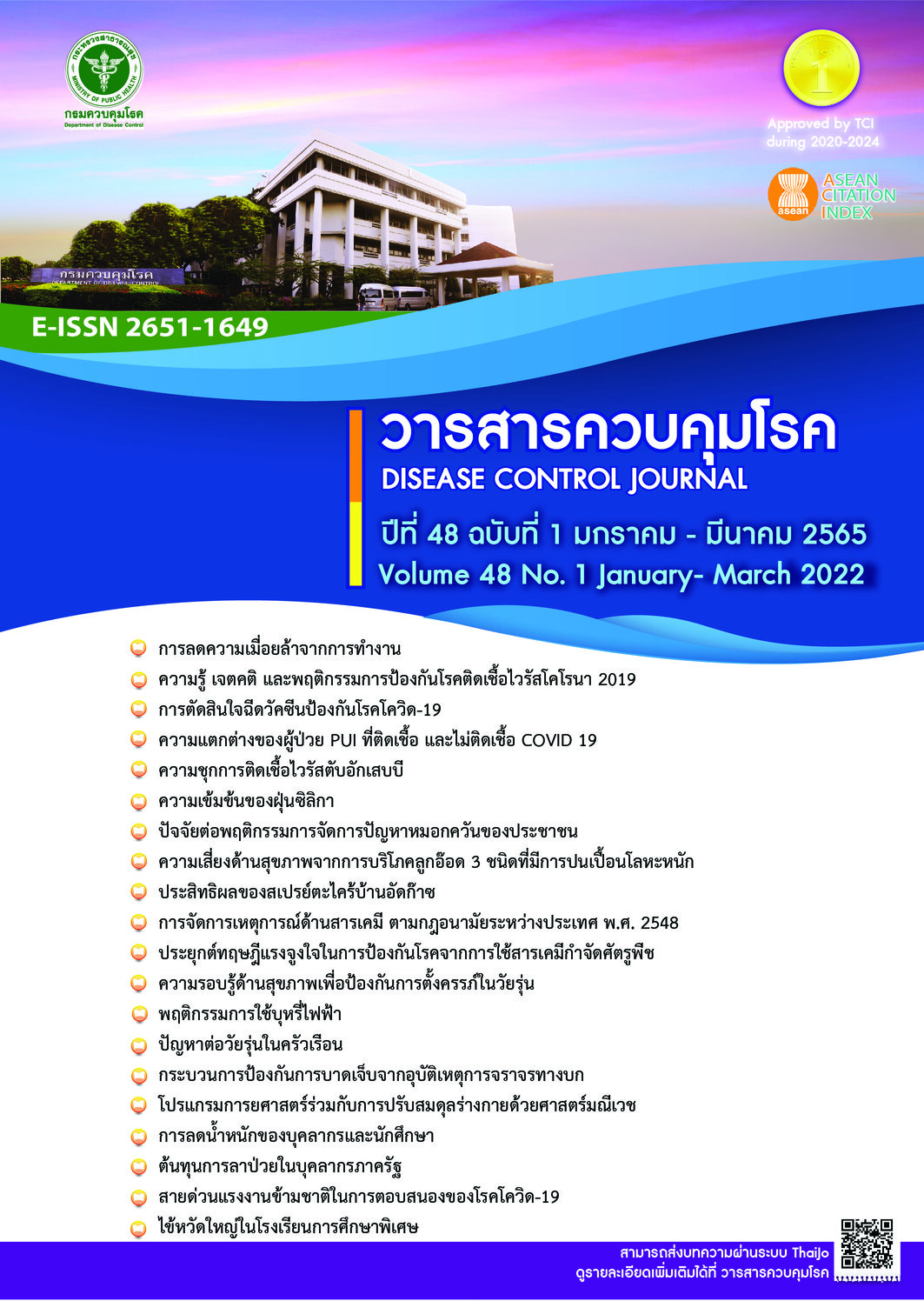Migrant Worker Hotline Performance Reporting in Response of COVID-19 in Thailand and the satisfaction assessment of migrant workers volunteers
DOI:
https://doi.org/10.14456/dcj.2022.19Keywords:
Reporting, Performance, Hotline, COVID-19, Satisfaction Assessment, Migrant Worker VolunteersAbstract
The objectives of this study were: 1. To report on the performance of the migrant workers hotline in helping migrant workers to access and receive information health knowledge resulting in cooperative behavior in disease prevention and control and responding to the COVID-19 outbreak 2. To assess the satisfaction of migrant workers volunteers in the prevention and control of the COVID-19 outbreak about migrant workers. Data were collected from migrant workers' hotline 1422 volunteers from neighboring countries (Myanmar, Cambodia, and Lao People’s Democratic Republic). Data were collected from migrant volunteers who served as operators of the migrant hotline by using questionnaires that contain general questions and performance evaluations of the operators. Descriptive statistics including frequencies and percentages were applied in this study. From 1-31 May 2020, there were a total of 189 calls on the COVID-19 hotline service. The findings of the study indicated the top three types of issues that hotline operators have been provided information. These lists of most commonly reported issues were arranged in a descending order: 1) Cross-border travel, registration for repatriation, documents for registration for repatriation flights, embassy contact details, information for passport and visa requirements, 2) COVID-19 situations in Thailand and neighboring countries, 3) Unemployment, termination of employment, loss of income, compensation and social security benefits. Assessments of volunteer operators’ satisfaction showed that respondents’ satisfaction towards the training session which includes training content, knowledge transfer, and duration of course and training handbook was 80 percent. The majority of the respondents had a high level of satisfaction (60%) for the readiness of operators to perform the duties, including the number of operator’s availability, information, resources of information, capacity building of the network. However, the results demonstrated that the majority of the respondents had a low level of satisfaction regarding the availability of equipment (60%) and most of the volunteers rated their satisfaction level high for happiness and pride after serving as the operators (60%). The results of this study can be used to develop, improve the operation of the next generation of migrant workers, and strengthen the network of migrant workers to prevent and control diseases to deal effectively with a potential the next wave of COVID-19. The results may also be useful for addressing other diseases.
Downloads
References
World Health Organization. Timeline: WHO's COVID-19 response 2020 [Internet]. [cited 2020 May 30]. Available from: https://www.who.int/emergencies/diseases/novel-coronavirus-2019/interactive-timeline.
Department of Disease Control. COVID-19 daily report 2020 [Internet]. [cited 2020 May 30]. Available from: https://data.go.th/dataset/covid-19-daily. (in Thai)
Department of employment, Ministry of labour. The number of migrant workers who are allowed to working in the Kingdom of Thailand during December 2019. Bangkok: Office of foreign workers administration; 2019. (in Thai)
Department of Disease Control. COVID-19 (EOC-DDC Thailand) [Internet]. 2020 [cited 2020 May 30]. Available from: https://ddcportal.ddc.moph.go.th/portal/apps/opsdashboard/index.html#/20f3466e075e45e5946aa87c96e8ad65. (in Thai)
Foreign Workers Administration Office. Migrant workers situation 2020 [Internet]. [cited 2020 May 30]. Available from: https://www.doe.go.th/prd/alien/statistic/param/site/152/cat/82/sub/76/pull/sub_category/view/list-label. (in Thai)
Ministry of Public Health. COVID-19 Hotline for Migrant Workers DDC 1422. Nonthaburi: Ministry of Public Health; 2020. (in Thai)
Provincial Waterwork Authority. Guidelines for the establishment of an automated telephone center (Call Center) of the Provincial Waterworks Authority. 2009. (in Thai)
Neumann M. Profile of callers to the Centers for Disease Control and Prevention national sexually transmitted diseases hotline. Sex Transm Dis. 1996;23(2):131-7.
Umchaum A. Work effectiveness of the 3BB contact center system: Case study of customer relations officer Triple T Broadband pcl. [Independent Study] Pathumthani: Rajamangala University of Technology Thanyaburi; 2012. (in Thai)
Chirawatkul S, Rungreangkulkij S, Rujiraprasert N. Lesson learned from development of hotline system for helping teens pregnant. TJNC. 2016;31(3):5-15. (in Thai)
Downloads
Published
How to Cite
Issue
Section
License
Copyright (c) 2022 Disease Control Journal

This work is licensed under a Creative Commons Attribution-NonCommercial-NoDerivatives 4.0 International License.
Articles published in the Disease Control Journal are considered as academic work, research or analysis of the personal opinion of the authors, not the opinion of the Thailand Department of Disease Control or editorial team. The authors must be responsible for their articles.






